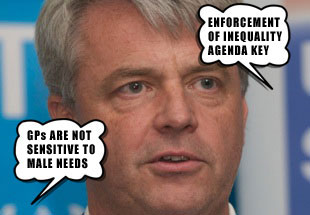My role
- About Us
MHF calls for an NHS Gender Equalities Board
The MHF has offered to help the government reform the NHS to be more gender-sensitive.
 Responding to white paper Equity And Excellence published by health secretary Andrew Lansley, right, the Forum has focused less on reservations about some changes and more on practical suggestions of how it can help make them work. It proposes to:
Responding to white paper Equity And Excellence published by health secretary Andrew Lansley, right, the Forum has focused less on reservations about some changes and more on practical suggestions of how it can help make them work. It proposes to:- help establish a Gender Equalities Board, to help the NHS Commissioning Board to deliver on its duty to tackle inequalities
- produce guidance for the proposed new GP consortia to replace Primary Care Trusts (PCTs) on how to commission gender-sensitive services and make their practices more accessible to men
- produce guidance for local authorities to help to ensure that Joint Strategic Needs Assessments (JSNAs) are gender-sensitive and based on gender-disaggregated data to ensure that the needs of both men and women are taken into account.
- help to develop targeted health information for men, in a variety of formats including online. (Male health and information technology will be the theme of National Men’s Health Week 2011).
The Forum’s response is based on an online survey of partners and other readers of this website, comments to the site and a roundtable of experts specifically convened to discuss the white paper. The MHF also contributed to the consultations organised by the DH for all its Strategic Partners.
Ten requests
The MHF response makes ten specific requests from government:
- establish a Gender Equalities Board within the NHS Commissioning Board,
- ensure GPs tackle gender inequalities in health outcomes by linking these outcomes to GP practice income,
- reform the Quality Outcomes Framework to ensure that it rewards tackling gender inequalities in health,
- specify indicators within the National Outcomes Framework to address the disproportionate level of premature death amongst men (currently two thirds of people who die prematurely in this country are men).
- develop health information specifically targeted at men,
- ensure that local HealthWatch organisations are required to engage with those who experience the worst health inequalities.
- ensure that HealthWatch England does the same at a national level,
- give the proposed Health and Well-being Boards sufficient powers to ensure that GP consortia and others, commission services to address the health inequalities highlighted by local JSNA,
- ensure that the NHS Commissioning Board has sufficient powers to ensure that GP consortia fulfil their duty to tackle health inequalities,
- extend GP opening hours, make it easier to book appointments (both online and by telephone) and ensure that it is possible to register with a number of GP surgeries, to facilitate easier access.
GPs 'don't take account of men'
 On the central plank of the white paper, to replace PCTs with GP consortia, MHF CEO Peter Baker, right, said: ‘The move represents a substantial shift from current practice. In the past, most PCTs have not commissioned services that take proper account of men. This situation could well deteriorate under the new arrangements without significant practical guidance and enforcement. Currently, it is unclear how the NHS Commissioning Board will monitor the performance of GP consortia in meeting duties to tackle health inequalities and promote equality in line with the Equality Act.'
On the central plank of the white paper, to replace PCTs with GP consortia, MHF CEO Peter Baker, right, said: ‘The move represents a substantial shift from current practice. In the past, most PCTs have not commissioned services that take proper account of men. This situation could well deteriorate under the new arrangements without significant practical guidance and enforcement. Currently, it is unclear how the NHS Commissioning Board will monitor the performance of GP consortia in meeting duties to tackle health inequalities and promote equality in line with the Equality Act.'Peter described the idea of establishing Health and Well-being Boards to promote integration across NHS health services, public health and social care as ‘ambitious’. He said the board’s success would be determined by their ‘membership, powers and extent of cooperation between them’.
‘There are a number of potential conflicts within the system,’ he said, ‘including a confusion between national and local priorities. Unless there is integration between local needs and the national NHS Outcomes Framework, there is a danger that the needs of those experience the worst inequalities may be overlooked.
'There must be a mechanism in place to ensure that the most vulnerable and those who it is difficult to access do not "fall through the cracks". There may well be the temptation to pass responsibility to another statutory agency for time-consuming and expensive-to-access groups. There must be a means to ensure that this does not happen. Health and Well-being Boards must have an overview and scrutiny function.’
Page created on October 6th, 2010
Page updated on October 8th, 2010
Comments
In This Section
Haringey health humour
I'd rather admit I love John Ryan!


 Donate to the MHF
Donate to the MHF
 Man MOT
Man MOT